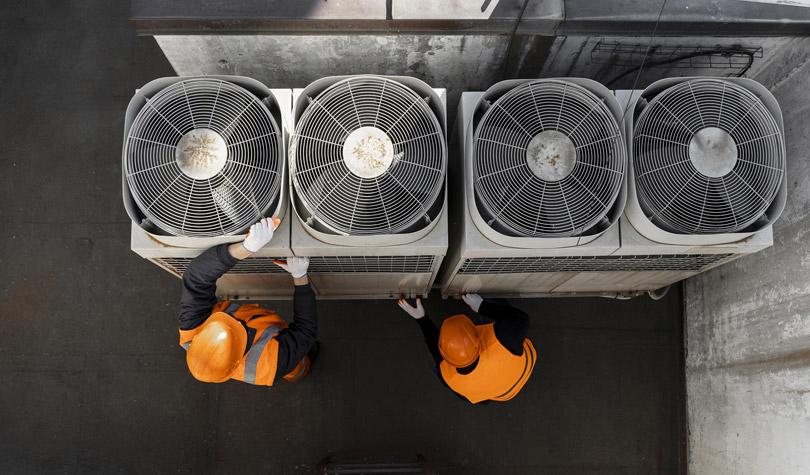SEER stands for Seasonal Energy Efficiency Rating. It’s a government-backed rating system, maintained and updated by the Department of Energy, and reflects how energy-efficient a given HVAC system is.
The rating measures the cooling efficiency of a system for a typical cooling season. It is calculated by taking your unit’s total cooling capacity and dividing it by the total energy input.
In simple words: how much energy (electricity) it will take for your HVAC unit to give you its full-capacity cooling.

Image Source: freepik.com/freepik
The higher the rating, the more energy-efficient the system.
What is SEER2?
SEER2 is the updated version of SEER and has been developed using a new testing procedure that utilizes the M1 blower technique.
The SEER standards held for 30 years but the technological advancements in the past years had made it a necessity to revise the ratings and adopt standards that were more accurately reflective of modern energy-efficient appliances.
The new ratings went into effect on January 1, 2023.
What is a good SEER2 rating?
Generally, a high SEER2 rating means a much more energy-efficient system.
But depending on where in the U.S. you live, different energy ratings are going to mean different levels of energy efficiency for your specific climate. The minimum SEER2 standards released by the DoE vary by region.
Here is the breakdown:
• Southeast Region
If your residential HVAC system is:
- Less than 45,000 Btu, the SEER2 rating must be at least 14.3 (15.0 SEER).
- More than or equal to 45,000 Btu, the SEER2 rating must be at least 13.8 (14.5 SEER).
• Southwest Region
If your residential HVAC system is:
- Less than 45,000 Btu, the SEER2 rating must be at least 14.3 (15.0 SEER).
- More than or equal to 45,000 Btu, the SEER2 rating must be at least 13.8 (14.5 SEER).
• North Region
In the North, all AC units manufactured before January 1, 2023, that have a SEER rating of 13.0 can be installed after the SEER2 updates.
Additionally, consumers in the North region can use an AC unit of below or more than 45,000 Btu with a minimum SEER2 rating of 13.4 (14.0 SEER).
Here you can learn more about SEER2 ratings and how it impacts your HVAC installations.
Is A Higher SEER2 Rating Worth The Cost?
When you are thinking of installing a new HVAC system in your place, you might be tempted to go for a unit that boasts a higher SEER2 rating. After all, a higher rating means higher efficiency, right?
One hundred percent.
But it also comes at a high upfront cost. Plus, exactly how much of a difference could there be between a 14 and 17 SEER2 rating, for example?
Let’s see.
If you’re thinking about efficiency in terms of cost and savings, there isn’t a lot of difference between these two ratings. Probably upward of $100 a year in energy savings but not more. And that’s not a difference worth buying a significantly more expensive high-SEER2 unit.
But the cost is not the only factor here.
Comfort is important, too.
An AC unit that has a SEER2 rating of 17 or around that will be equipped with components that provide a higher level of comfort and more consistent cooling.
How to ensure maximum HVAC energy efficiency for your house?
It depends on a number of factors. How large your house is, the thermostat temperature you keep using, how well-insulated your house is, and more.
Here is a list of all things you can do to ensure maximum energy efficiency in your house:
- Buy a properly sized unit
- Seal the ductwork for proper insulation
- Test windows and doors
- Get your HVAC maintained and regularly repaired
- Change air filters regularly
- Install a programmable thermostat
- Use curtains and blinds
- Use ceiling fans
- Take proper care of your furnace and change it when needed
If your HVAC system is giving poor output or you’re experiencing other problems with it, it may be time to call in your local HVAC technicians for a proper look-over.
Conclusion
The new SEER2 standards have been updated to help consumers enjoy a higher level of comfort and cost savings using more energy-efficient residential cooling systems.
If you are planning to install a new AC or upgrade to the latest model, look out for new ratings to ensure you get the best for your home.
Before you go for the buying trip, or click on the Add to Cart button, however, it’ll be a good idea to give us a call at 267-471-9323 (PA) or 609-373-9707 (NJ).
Our licensed techniques will give you a free consultation and help you choose a unit that best suits your needs.


